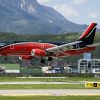When it comes to strictly regulated activities, such as aircraft ground handling, where speed and safety are top priorities, virtual reality (VR) stands out as a perfect technology to train operators in a nearly real-life environment. While VR is nothing new in pilot training, for ground handling it is still a novelty.
Baltic Ground Services (BGS) Group – an aircraft and passenger ground handling, and fueling company, part of Avia Solutions Group, which is currently moving its training to virtual reality environment, also plans offering VR based training as an additional service in the market.
“Virtual reality training in ground handling is a new trend, and we are amongst the pioneers developing it,” says Konradas Dulka, Head of BGS Group IT Business Solutions. Virtual reality becomes a bridge between the theoretical learning and the field practice, and it increases the speed and quality of the training.
According to Paulius Miezelis, BGS Head of Training, by using virtual reality environments, trainees can repeat same complex tasks and situations without a need to wait for another aircraft turnaround until they are entirely confident to try operations in reality.
“This minimizes the probability of mistakes. Also, there is a possibility to simulate extraordinary and extreme situations, eliminate the noisy environment of the airport, which disturbs trainees during the training,” states Mr. Miezelis.
BGS already created aircraft walk around inspection and fuelling VR training modules. By the end of the year, the company will add aircraft de-icing and anti-icing VR training modules.
“We are striving to create not only a simulator for procedures but also a tool with analytics integrated which will allow monitoring the efficiency of the trainee,” – adds Mr. Dulka, Head of IT Business Solutions at BGS Group.
BGS pays lots of attention to the graphics and sound effects to make VR training environment immersive and provide the ultimate feeling of the real-life operations.





